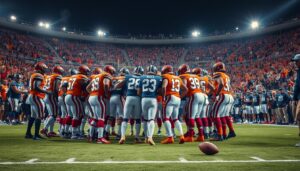For optimal sports performance, fuel your body with balanced meals and stay hydrated. Prioritize proteins, healthy fats, and carbohydrates.
Sports nutrition plays a crucial role in enhancing athletic performance and recovery. Athletes need a well-balanced diet to fuel their bodies and support strenuous activities. Consuming the right mix of nutrients before, during, and after workouts can boost energy levels and improve endurance.
Proteins help in muscle repair and growth, while carbohydrates provide essential energy. Healthy fats are necessary for overall health and sustained energy. Staying hydrated is equally important, as dehydration can impair performance and recovery. Adopting these sports nutrition tips can lead to better performance and overall well-being.
Importance Of Sports Nutrition
Proper sports nutrition fuels athletes’ bodies. It supports peak performance and aids recovery. Consuming the right nutrients can make a big difference in an athlete’s success. This section will delve into the critical roles that sports nutrition plays.
Role In Performance
Athletes need more energy than non-athletes. Carbohydrates are the main energy source. They help athletes sustain high-intensity activities. Proteins are essential for muscle repair and growth. Fats are also important. They provide long-lasting energy.
Hydration is another key factor. Dehydration can impair performance. Drinking enough water or sports drinks can maintain fluid balance. Proper nutrition ensures that athletes have the stamina to perform at their best.
Preventing Injuries
Good nutrition helps prevent injuries. Strong muscles and bones are less likely to get hurt. Calcium and Vitamin D are crucial for bone health. Proteins and amino acids help repair tissues. Omega-3 fatty acids can reduce inflammation.
Balanced meals before and after exercise are important. They support recovery and reduce injury risks. Athletes should focus on nutrient-rich foods. This can include fruits, vegetables, lean proteins, and whole grains.
| Nutrient | Role |
|---|---|
| Carbohydrates | Primary energy source |
| Proteins | Muscle repair and growth |
| Fats | Long-lasting energy |
| Calcium | Bone health |
| Vitamin D | Bone health |
| Omega-3 Fatty Acids | Reduce inflammation |
Athletes should consult a nutritionist. Personalized plans can maximize their performance and safety.
Macronutrients For Athletes
Athletes need a balanced diet to perform at their best. Macronutrients, which include carbohydrates, proteins, and fats, are crucial. These nutrients provide energy, build muscle, and support recovery. Understanding the role of each macronutrient helps athletes optimize their diet.
Carbohydrates
Carbohydrates are the primary source of energy for athletes. They fuel muscles during exercise. Athletes should focus on consuming complex carbs like whole grains, fruits, and vegetables. These provide sustained energy and essential nutrients.
| Source | Carbohydrate Content |
|---|---|
| Oatmeal | 27g per cup |
| Brown Rice | 45g per cup |
| Banana | 27g per medium |
Proteins
Proteins are essential for muscle repair and growth. Athletes need adequate protein to recover after training. Good sources include lean meats, dairy, beans, and nuts. Protein intake should be spread throughout the day for the best results.
- Chicken Breast – 31g per 100g
- Greek Yogurt – 10g per 100g
- Almonds – 21g per 100g
Fats
Fats provide long-lasting energy and support cell function. Healthy fats are vital for hormone production and brain health. Athletes should include sources of unsaturated fats in their diet. Examples include avocados, olive oil, and fatty fish.
- Avocado – 15g per half
- Olive Oil – 14g per tablespoon
- Salmon – 13g per 100g
Balancing these macronutrients helps athletes maintain energy levels and improve performance. Each nutrient plays a unique role in supporting athletic health.
Hydration Strategies
Proper hydration is essential for athletes. It boosts performance and prevents dehydration. This section focuses on Hydration Strategies to follow before, during, and after exercise.
Before Exercise
Hydrate well before starting your workout. Drink water or a sports drink. This prepares your body for the effort ahead.
- Drink 500-600 ml of water two hours before exercise.
- Take 200-300 ml of water 20 minutes before starting.
- Avoid caffeinated or alcoholic beverages.
During Exercise
Staying hydrated during exercise is crucial. It helps maintain performance and prevents fatigue.
- Drink 100-200 ml of water every 15-20 minutes.
- For intense workouts, use a sports drink with electrolytes.
- Monitor your sweat rate to adjust fluid intake.
| Exercise Duration | Fluid Recommendation |
|---|---|
| Less than 1 hour | Water |
| More than 1 hour | Sports drink with electrolytes |
After Exercise
Rehydrate after exercise to help recovery and restore fluid balance.
- Drink 500-700 ml of water within 30 minutes after exercise.
- Consume drinks with sodium to retain fluids.
- Check urine color to monitor hydration status.
Follow these hydration strategies to stay hydrated and perform your best.

Credit: www.terryclarkfitness.com
Pre-workout Nutrition
Eating the right foods before a workout is essential. It helps you perform better and recover faster. Proper pre-workout nutrition can make a big difference in your exercise routine.
Meal Timing
Timing your pre-workout meal is crucial. Eating at the right time ensures your body has enough energy. Ideally, eat a meal 2-3 hours before your workout. This meal should contain a mix of carbohydrates, protein, and fats.
If you’re short on time, a smaller snack 30-60 minutes before exercise works. Choose foods that are easy to digest. This prevents stomach discomfort during your workout.
Food Choices
Your food choices before a workout matter. Carbohydrates are your body’s primary energy source. They fuel your muscles and brain. Include whole grains, fruits, and vegetables in your pre-workout meal.
Proteins play a key role in muscle repair and growth. Good sources include lean meats, dairy products, and plant-based options like beans and lentils. A small amount of healthy fats is also beneficial. Nuts, seeds, and avocados are good choices.
| Food Type | Examples |
|---|---|
| Carbohydrates | Whole grains, fruits, vegetables |
| Proteins | Lean meats, dairy, beans, lentils |
| Healthy Fats | Nuts, seeds, avocados |
Here is a simple pre-workout snack list:
- Banana with peanut butter
- Greek yogurt with berries
- Oatmeal with a dash of honey
- Apple slices with almond butter
- Whole grain toast with avocado
Choosing the right pre-workout nutrition improves your performance. It helps you get the most out of your workout.
Post-workout Recovery
After an intense workout, your body needs proper recovery. This helps your muscles rebuild and grow stronger. Post-workout nutrition plays a vital role in this process. Focus on replenishing glycogen and protein for muscle repair.
Replenishing Glycogen
Your muscles use glycogen as fuel during exercise. Post-workout, it’s important to replenish glycogen stores. This helps restore energy and prepare for the next workout.
Here are some foods rich in carbohydrates to help replenish glycogen:
- Bananas
- Oatmeal
- Sweet potatoes
- Rice
- Whole-grain bread
Protein For Muscle Repair
Protein is essential for muscle repair and growth. After a workout, your muscles are in need of protein to rebuild. Consuming protein-rich foods helps speed up recovery.
Consider these protein sources for effective muscle repair:
- Chicken breast
- Eggs
- Greek yogurt
- Tofu
- Protein shakes
Here’s a simple table summarizing the key foods:
| Food Type | Examples |
|---|---|
| Carbohydrates | Bananas, Oatmeal, Sweet Potatoes, Rice, Whole-grain bread |
| Protein | Chicken breast, Eggs, Greek yogurt, Tofu, Protein shakes |

Credit: www.amazon.com
Supplements For Athletes
Sports nutrition is essential for athlete performance. One crucial part involves supplements. Supplements provide nutrients that may be missing in an athlete’s diet. They can enhance performance and support recovery.
Common Supplements
Athletes use various supplements to boost their performance. Here are some common ones:
- Protein Powders: Helps in muscle repair and growth.
- Creatine: Increases muscle mass and strength.
- Branched-Chain Amino Acids (BCAAs): Reduces muscle soreness.
- Beta-Alanine: Improves exercise capacity.
- Multivitamins: Provides essential vitamins and minerals.
Benefits And Risks
Supplements offer various benefits but also have risks. Here is a table to illustrate:
| Supplement | Benefits | Risks |
|---|---|---|
| Protein Powders | Helps build muscles | May cause digestive issues |
| Creatine | Enhances strength | Can cause dehydration |
| BCAAs | Reduces muscle fatigue | Possible nausea |
| Beta-Alanine | Improves performance | Can cause tingling |
| Multivitamins | Supports overall health | Possible overdose |
Meal Planning Tips
Proper meal planning is crucial for athletes. It helps in maintaining energy levels and achieving peak performance. Here are some essential meal planning tips to enhance your sports nutrition.
Balancing Macronutrients
Balancing macronutrients is key for athletes. Ensure a good mix of carbohydrates, proteins, and fats in every meal. Carbohydrates provide quick energy. Proteins are essential for muscle repair. Fats offer long-term energy.
| Macronutrient | Role | Sources |
|---|---|---|
| Carbohydrates | Quick energy | Whole grains, fruits, vegetables |
| Proteins | Muscle repair | Lean meats, beans, dairy |
| Fats | Long-term energy | Nuts, avocados, olive oil |
Incorporating Snacks
Snacks are important for sustained energy. They prevent energy crashes during training. Choose healthy, nutrient-dense snacks. Avoid junk food.
- Fruits: Apples, bananas, berries.
- Nuts and seeds: Almonds, chia seeds, walnuts.
- Protein bars: Choose low-sugar options.
- Yogurt: Opt for Greek yogurt.
Plan snacks around workouts. Eat a small snack 30 minutes before exercising. This boosts energy and performance.
Tailoring Nutrition To Sport
Different sports require specific nutrition strategies to optimize performance. Tailoring nutrition to your sport ensures your body gets the right fuel. This section covers nutrition tips for both endurance sports and strength training.
Endurance Sports
Endurance athletes need long-lasting energy. Carbohydrates are essential for these athletes. They provide the primary fuel for prolonged activities.
- Carbohydrates: Aim for whole grains, fruits, and vegetables.
- Proteins: Include lean meats, dairy, and plant-based proteins.
- Fats: Healthy fats from nuts, seeds, and fish are beneficial.
Hydration is also critical. Drink water regularly before, during, and after events. Electrolyte drinks can help replace lost minerals.
| Nutrient | Recommended Intake |
|---|---|
| Carbohydrates | 3-5 grams per pound of body weight |
| Proteins | 0.5-0.7 grams per pound of body weight |
| Fats | 0.3-0.4 grams per pound of body weight |
Strength Training
Strength athletes focus on building muscle. Protein intake is crucial for muscle repair and growth.
- Proteins: Aim for 1-1.5 grams per pound of body weight.
- Carbohydrates: Include whole grains, oats, and legumes.
- Fats: Healthy fats like avocado and olive oil are important.
Pre- and post-workout nutrition can enhance performance. Consider a protein and carb mix for recovery.
- Pre-workout: A small meal with protein and carbs.
- Post-workout: Protein shake or meal within 30 minutes.
Hydration is also key. Drink water throughout your workout.
Monitoring Progress
Monitoring progress in sports nutrition is crucial for achieving your fitness goals. Keeping track of your intake and making adjustments to your diet can lead to better performance and overall health.
Tracking Intake
To improve your nutrition, start with tracking your food intake. Use a food journal or an app to log your meals. Recording what you eat helps you identify patterns and areas for improvement. Track macronutrients such as proteins, carbs, and fats. Also, keep an eye on micronutrients like vitamins and minerals.
Consider the following tips for effective tracking:
- Write down everything you eat and drink.
- Note portion sizes and meal times.
- Include snacks and supplements.
By consistently tracking intake, you gain insights into your diet. This helps in making informed decisions about your nutrition plan.
Adjusting Diet
Once you have tracked your intake, the next step is adjusting your diet. This involves making changes based on your goals and progress. If you want to build muscle, increase your protein intake. For weight loss, reduce your calorie consumption.
Here are some tips for adjusting your diet:
- Assess your nutrient needs based on activity level.
- Adjust portion sizes to meet your goals.
- Incorporate a variety of foods for balanced nutrition.
Making small, gradual changes can lead to sustainable results. Monitor how these adjustments impact your performance and energy levels.
| Goal | Diet Adjustment |
|---|---|
| Build Muscle | Increase protein intake |
| Weight Loss | Reduce calorie consumption |
| Improve Endurance | Boost carbohydrate intake |
Regularly review your progress and adjust your diet accordingly. This ensures you stay on track to meet your fitness goals.

Credit: www.acesnation.org
Frequently Asked Questions
What Are The Best Pre-workout Snacks?
The best pre-workout snacks include bananas, Greek yogurt, or a handful of almonds. These options provide quick energy and are easy to digest.
How Much Protein Do Athletes Need Daily?
Athletes typically need between 1. 2 to 2. 0 grams of protein per kilogram of body weight daily. This helps with muscle repair and growth.
What Should I Eat After A Workout?
After a workout, eat a mix of protein and carbs. Examples include a protein shake with a banana or chicken with rice.
Is Hydration Important For Athletic Performance?
Yes, hydration is crucial for athletic performance. Drink water before, during, and after exercise to stay hydrated and maintain energy levels.
Conclusion
Achieving peak performance requires smart nutrition choices. Focus on balanced meals, hydration, and proper timing of nutrients. These sports nutrition tips can elevate your game. Remember, consistency is key to success. Stick to these guidelines and watch your performance soar.
Stay committed and fuel your body right for optimal results.




